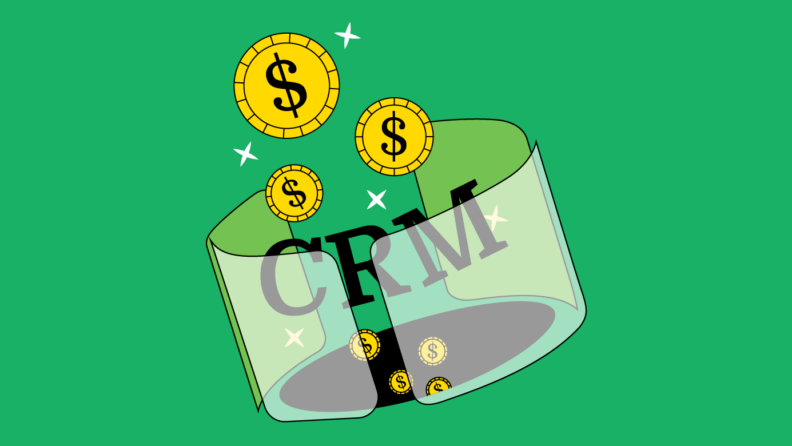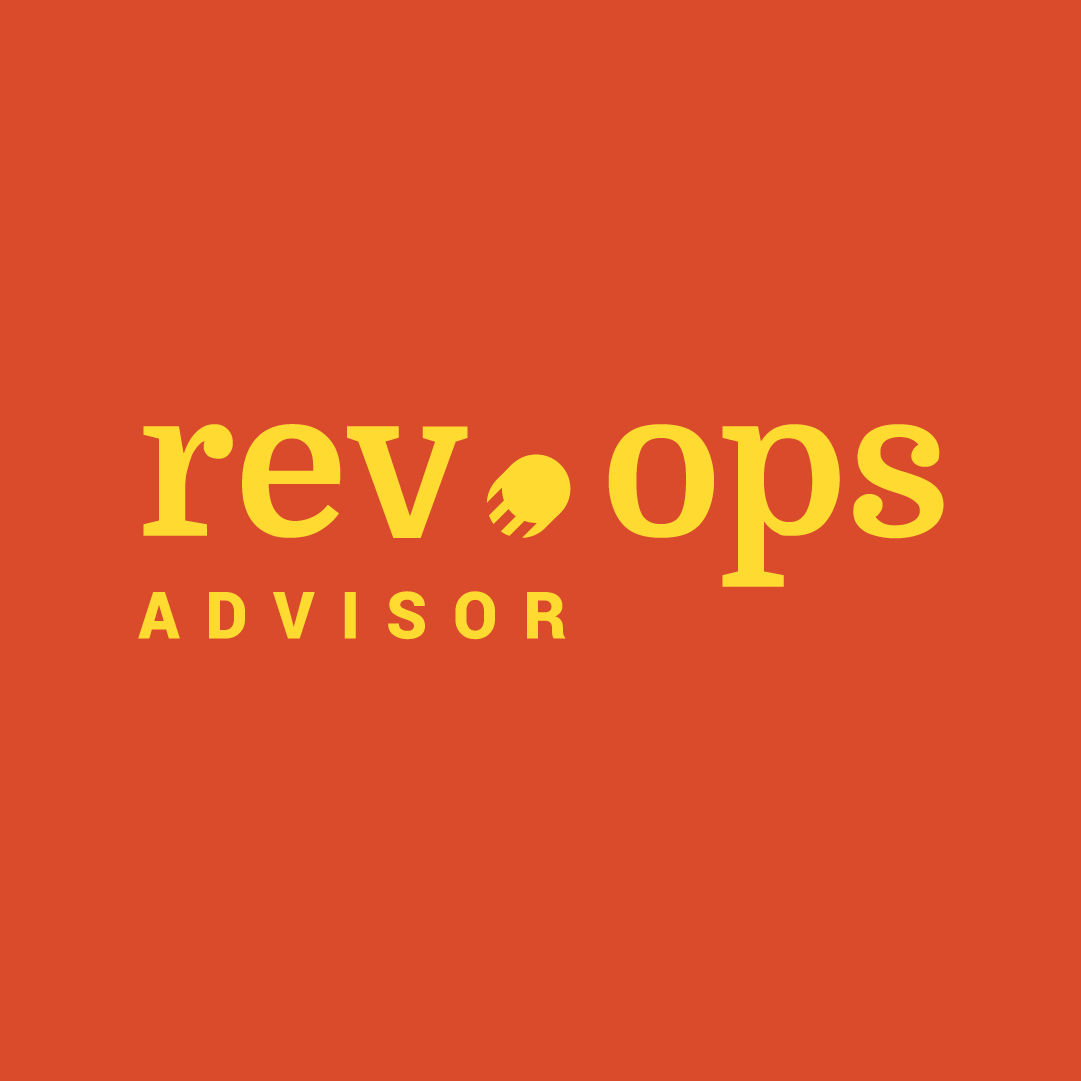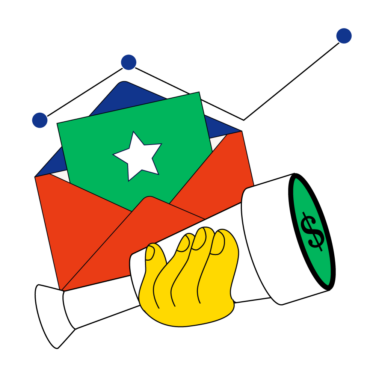Your customer relationship management (CRM) software is one of the most valuable resources your go-to-market teams have in their toolbox. It’s the glue that connects your marketing campaigns with your sales funnel and your overall customer experience.
And in a way, alignment is the single greatest benefit of the top CRM software.
But as you break it down by GTM team (sales, marketing, and customer success), even more benefits rise to the surface. Let's unpack all the major benefits together.
And hey, no time to read the entire article? Feel free to jump to our infographic summarizing 9 CRM benefits below.
What Is CRM Software?

CRM software is a cloud-based digital platform that stores customer data, such as contact information, purchase history, and previous communications.
It has tools to help you automate your marketing efforts, manage your sales pipeline, and provide customer support. These software solutions also offer analytics and reporting tools to help you understand the performance of your revenue-generating activities.
Leading companies use a CRM as a single source of truth for customer data and interactions across the customer journey—from initial interest through offboarding.
Benefits Of CRM Software For Marketing Teams

Your marketing team generates demand for your company's products or services among your target audience. A CRM system (especially a collaborative CRM) is critical for marketing efforts, centralizing lead contact information, integrating with marketing automation tools, and housing all the data needed to make strategic decisions.
The three key benefits of CRM software for marketing teams are:
1. Enhanced lead generation and tracking
A CRM helps track lead sources and how they move through the buyer's journey.
Marketing teams can target the best lead channels and invest budgets in the highest-converting platforms. Improved lead generation feeds your sales funnel with higher-quality prospects.
Marketing teams can also use a CRM to monitor how new customers discover your products and eventually enter the sales pipeline. This helps you develop clearer, more nuanced customer profiles and personas, which can inform everything from your marketing strategy to your product strategy.
2. Targeted, personalized marketing campaigns
Marketers can use segmentation and smart rules to personalize email marketing, advertising, landing pages, and more using CRM data.
And these days, creating personalized brand experiences isn’t just a nice to have but a necessity:

3. Efficient asset and resource management
Most marketing teams have a lot of collateral — from ebooks to white papers to ad graphics and copy decks. Some CRM software has asset management built-in, allowing you to keep track of all your marketing assets right in the platform.
If you can’t manage your resources within the CRM itself, CRM integrations will usually help you connect your content management system (CMS) or a digital asset management (DAM) system.
Benefits Of CRM Software For Sales Teams

Sales teams take over qualified leads from the marketing team or prospect their own leads and turn them into paying customers.
Your sales reps do targeted outreach, demo your products to potential customers, and negotiate to close deals. A CRM solution is absolutely vital in these efforts.
Here are 3 major benefits of a CRM for sales teams:
4. Clearer lead and opportunity tracking
You can monitor customer interactions at every stage of the customer journey with a CRM. This gives your sales reps a clear and comprehensive overview of how leads become potential customers and allows them to craft their lead management process and sales process accordingly.
Tools like forecasting and real-time updates help your team know when it’s the best time for outreach, follow-up, and upselling.
Need more data? Read these statistics on the impact of a CRM.
5. Streamlined sales processes and workflows
By tracking your sales performance metrics over time, your salespeople gain valuable insights about sales cycles and market trends. The sales reports from your CRM can inform how your team members prioritize their work quarter to quarter, or from one season to the next. It can help them take a more strategic approach in their sales processes.
You can also use this data to streamline your sales team’s workflows, cutting out redundant tasks or automating time-consuming manual work like data entry.
Consider this CRM Case Study: Design firm CliqStudios implemented Freshworks CRM to unify the sales process across teams. Thanks to the software and training, they sped up sales cycles by 35% and streamlined lead allocation with a new round-robin lead routing format.
The automation functionality of CRM software can be quite robust. You can also use built-in tools like templates and notifications to speed up your work processes.
6. Improved collaboration and communication

As the saying goes, alone you go fast, but together you go far.
Collaboration features built into CRM systems can help sales teams stay connected and avoid redundancy in their work. Tools like automated lead routing assign incoming prospects to the appropriate sales rep. Meanwhile, private notes and historical data housed int he CRM provide contextual customer information that helps salespeople pick up where their marketing colleagues left off.
Benefits Of CRM Software For Customer Success Teams

The final stage of the customer journey will hopefully be the longest one — and that’s where your customer experience or customer service team comes in. They’re responsible for monitoring customer behavior and addressing customer needs to improve overall customer satisfaction and customer loyalty.
These are the 3 main benefits of a CRM tool for customer success teams:
7. Comprehensive customer profiles and history
A CRM can provide data about your existing customer’s business needs, the SaaS tools and apps they use, and their purchase history with your company.
This gives customer service reps a holistic overview of each customer’s relationship with your brand. So when a customer reaches out for support, they have all the context they need to provide exceptional customer service. This is important, because:

8. Proactive customer monitoring and engagement
In addition to being prepared for customer support tickets, your CRM can also help your customer success team take a more proactive approach to customer retention. In other words, your CS team can better understand customer relationship management and take the execution into their own hands.
Most CRM software will be able to help you track churn risk, giving your team a heads-up on who might need a bit of extra care. Some platforms even track social media activity and indicators that customers are checking out your competitors.
A customer health dashboard is one of the most valuable ways to utilize CRM data.
9. Efficient ticket and issue management
Many modern CRMs have built-in help desk functionality or can easily connect to your help desk software.
This allows CSMs to manage incoming customer communications across multiple channels. Your team can respond to chatbot and social media messages, emails, and even phone calls through your CRM. It creates a centralized database to manage customer information, communications, history, and more.
The Benefits Of CRM Software: Infographic
Looking for a TL;DR of the benefits outlined above? Check out this infographic for a quick summary of the 9 major benefits of CRM software (and hey, save it for later!):

Finding The Best CRM Software For Your RevOps Teams
Clearly, investing in CRM software can benefit your business processes and GTM team alignment — not to mention your company’s profitability and bottom line. But how do you select the best CRM software to meet the needs of your revenue operations teams?
5 things to consider when selecting a CRM platform:
- How will your teams use the software? Come up with some use cases and examples of how your teams will use CRM software.
- Do you have a CRM strategy in place? This might include things like who will be using it, what for, and the goals associated with implementing the software.
- What’s your budget? Consult with your financial department, research the cost of CRM software, and seek out pricing that’s within your means.
- Do you need a specialized solution? There are small business CRMs, enterprise CRMs, real estate CRMs, nonprofit CRMs, and more!
- Can you try it out? Many software providers offer free trials and demos, and there are some completely free CRM software available, too.
If you have very specific requirements or need help prioritizing your CRM needs, a CRM RFP can help you organize your thoughts, find relevant vendors, and compare CRM offerings.
These are a few of my favorite CRMs on the market right now:
Need expert help selecting the right CRM Software?
We’ve joined up with Crozdesk.com to give all our readers (yes, you!) access to Crozdesk’s software advisors. Just use the form below to share your needs, and they will contact you at no cost or commitment. You will then be matched and connected to a shortlist of vendors that best fit your company, and you can access exclusive software discounts!
Align Your Teams With CRM Software
CRM software has come a long way from its humble beginnings. What was once a way to replace spreadsheets (or a rolodex) is now a comprehensive, centralized system to manage various business processes and data.
Aligning your sales, marketing, and customer success teams is key to your organization’s success. This alignment is how you craft a cohesive customer experience and nurture customer loyalty. It starts with getting everyone into the same system and using the same tools (these best practices for CRM can help).
Ready to take your RevOps to the next level? Sign up to get software reviews, expert advice, and career resources delivered right to your inbox.




